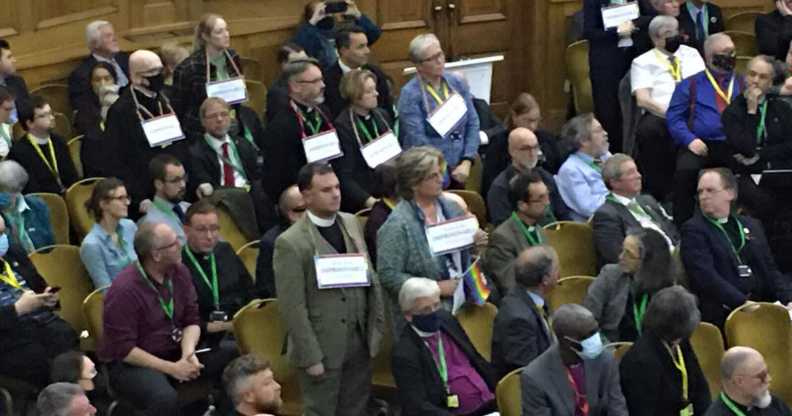LGBT+ Church of England members stage defiant protest after archbishop of Canterbury’s Ghana apology

LGBT+ members of the Church of England stood up to show solidarity with LGBT+ Ghanaians at the General Synod. (Provided)
A gay canon and other LGBT+ members of the Church of England have staged a demonstration at a meeting of the General Synod to show solidarity with queer Ghanaians.
Canon Simon Butler spoke out in defence of Ghana’s embattled LGBT+ community during a debate at the Church of England’s General Synod (its legislative body) on Tuesday (16 November). It followed a controversial intervention from archbishop of Canterbury, Justin Welby.
Welby had raised his “grave concerns” after the Anglican Church of Ghana expressed support for a law that would criminalise LGBT+ people in the African nation. However, the archbishop backtracked in a much-criticised statement posted to Twitter on Monday (15 November).
In his statement, Welby apologised to the leaders of the Ghanaian church for his intervention, saying he should have spoken directly to those involved. He also acknowledged that he had “no authority” over the Church of Ghana and referenced Britain’s past colonisation in the country.
Gay canon Simon Butler urged Church of England members to ‘think very carefully’ about their words
Butler addressed the Synod directly after Welby read a pre-prepared statement on the matter, in which he said the leadership of the Anglican Church of Ghana “does not condone the criminalisation of the LGBT+ community”.
Butler thanked the archbishop of Canterbury and asked him to pass on his gratitude to those who had “worked hard to secure this clarification about criminalisation from the Ghanaian bishops”.
“This is a very serious matter indeed to hear the bishops in our sister church could support such a horrific thing and I give thanks to God for their change in approach,” Butler said.
Butler went on to tell the Synod that members of the church should “think very carefully” about the messages they deliver, saying their words “touch lives at home as well as overseas”.
“They touch lives of Christian people in Ghana, some of them LGBTI+, and they touch the lives of people like me here,” he said.
Directly addressing Welby, Butler continued: “Increasingly I feel that LGBTI people in the communion… are pleading to be listened to, while the ecclesiastical superpowers huddle together concerned about what can work for them.
He added: “I’ve done the sums, Synod. At least 10 per cent of this Synod are LGBTI+. The coming years will determine whether we are equal members or merely tolerated. Some of us today, but understandably on this first day not all of us, want to be visible. We want to signify our presence to you and demonstrate our solidarity with our Ghanaian LGBTI sisters and brothers.”

Canon Simon Butler speaking at the General Synod of the Church of England. (Church of England livestream)
The powerful act of solidarity culminated with LGBT+ members standing up wearing signs with the message “Soon to be imprisoned in Ghana” around their necks.
Butler told those gathered that at least 50 people in the Synod would face imprisonment under the terms of the Ghanaian law.
“Friends, this is just a simple gesture to remind us in the coming five years that this matter is about real lives – in Ghana and here,” Butler said.
“When we speak in this Synod, when we table questions or blog, or when we publish statements that will be read by victims of violence and those who want to do people like us harm, may this be the last occasion that we have to remind you of this.”
Archbishop of Canterbury said the Anglican Church of Ghana does not support the criminalisation of LGBT+ people
Butler’s address came immediately after Welby addressed the Synod about the ongoing controversy surrounding Ghana’s efforts to further criminalise LGBT+ identities.
Addressing those gathered, Welby said he wanted to “make a couple of comments about the situation in our relations with Ghana and in Ghana”.
“As I said in my first statement on the matter, which still stands, homophobia – including the criminalisation of LGBTQ+ people – is always wrong in any context,” the archbishop of Canterbury told the General Synod. He went on to reference biblical passages backing up his view.
“Additionally, and importantly in this matter, while not condoning same-sex marriage, the Anglican Church in Ghana does not condone the criminalisation of the LGBTQ+ community.
“I continue to pray for and seek to support all those who struggle and suffer in the LGBTQ+ community and all those who suffer also from the ongoing effects of colonialism and imbalances of global power.”
He implied that he is in continued discussions with the church in Ghana.
In a press release, Butler said LGBT+ members of the Synod wanted to “make it absolutely clear” that they stand with LGBT+ people in Ghana.
“There can be no compromise when fundamental human rights are threatened, whether by governments or bishops.”
Reverend Neil Patterson, who serves as vice chair of the General Synod Gender and Sexuality Group and who helped organise the protest, said: “We stood in solidarity with those in Ghana, because we are people, not a problem, and deserve to be part of the conversation.”
Jayne Ozanne, a Synod member and LGBT+ rights activist, said Christians have a duty to “protect the vulnerable and those who are most at risk”.
“We are called to be a ‘voice for the voiceless’, who in this instance are LGBTQI+ people in Ghana. There can be no excuses for homophobic legislation – not even on so-called ‘cultural’ grounds.”
Ghana’s LGBT+ community has been rocked in recent months by debate surrounding the Promotion of Proper Human Sexual Rights and Ghanaian Family Values Bill 2021. If passed, the legislation would make it a crime to advocator for LGBT+ rights, with those convicted facing up to 10 years in prison.
